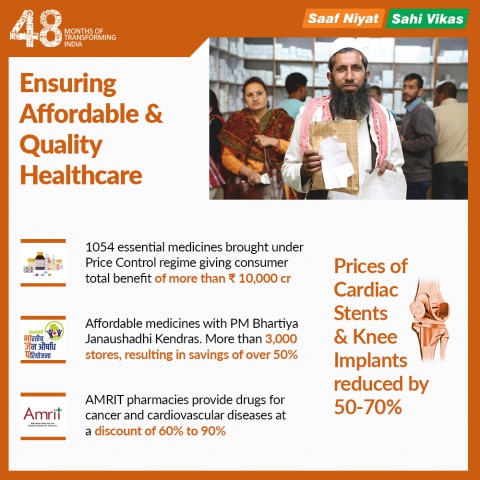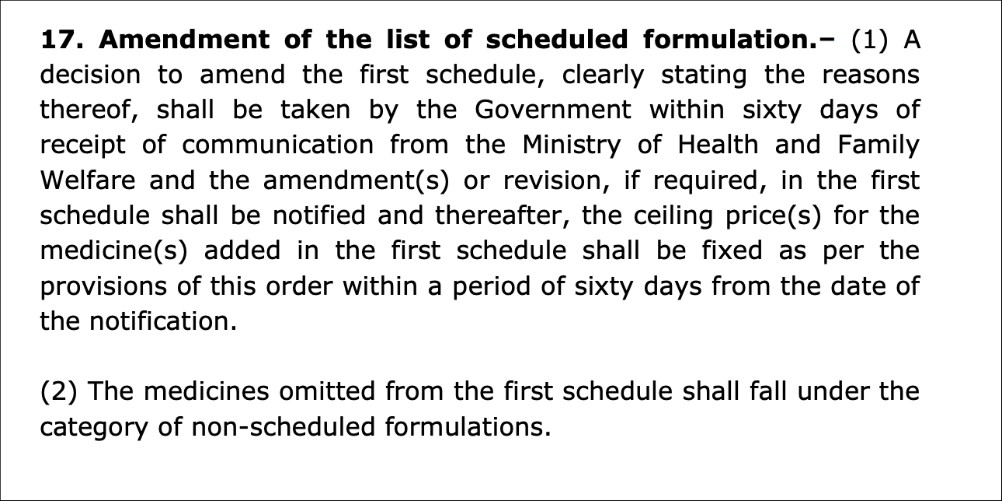[orc]The BJP government published an infographic on the 48-months portal that makes claims about affordable healthcare, specifically about essential medicines. This article is a fact check of the claims.
The BJP government published an infographic on the 48-months portal that makes claims about affordable healthcare, specifically about essential medicines. This article is a fact check of the claims.

Have some essential medicines been brought under price control? What have been the benefits?
The first claim is that ‘1054 essential medicines brought under price control regime giving consumers total benefit of more than 10,000 crores’.
The prices of drugs are controlled under the provisions of the Essential Commodities Act, 1955 where drugs are referred to as per their definition in the Drugs & Cosmetics Act, 1940. At present, the ceiling prices of medicines of various strength/dosage forms as declared by Ministry of Health & Family Welfare and included in the National List of Essential Medicines (NLEM), 2015, are fixed by National Pharmaceutical Pricing Authority (NPPA).
National Pharmaceutical Pricing Authority (NPPA), an independent body of experts under the Ministry of Chemicals & Fertilizers has the power, under the Drugs (Prices Control) Order, 2013 DPCO, 2013, to fix the prices of any drugs. However, the government does not maintain any information on a comparative basis with other countries.
The Government notified the National Pharmaceutical Pricing Policy, 2012 (NPPP-2012) in December 2012 with an objective to put in place a regulatory framework for pricing of drugs so as to ensure availability of required medicines or essential medicines at reasonable prices.
Pursuant to the announcement of National Pharmaceutical Pricing Policy, 2012 (NPPP, 2012), Government notified the DPCO 2013 in May 2013. All the medicines specified in the National List of Essential Medicines prepared by the Ministry of Health and Family Welfare and revised from time to time are included in the Schedule – I of DPCO, 2013 which are under price control in accordance with provisions of DPCO 2013.
As per para 17 of DPCO 2013, a decision to amend the first schedule (amendments to the list of essential medicines), can be taken by the Government clearly stating the reasons within 60 days of receipt of communication from the Ministry of Health and Family Welfare. Once the amendments are approved, these changes will be notified and the ceiling prices will be fixed within a period of 60 days from the date of notification.

According to a response in Lok Sabha in July 2014, ‘all the medicines specified in the National List of Essential Medicines, 2011 (NLEM, 2011) have been included in Schedule 1 of the Drugs (Prices Control) Order, 2013 (DPCO, 2013) which contains 348 drugs covering 680 formulations which also include some drugs for cancer and antibiotics. National Pharmaceutical Pricing Authority(NPPA) has notified prices of 440 scheduled formulations up to June 2014. Significant reduction in prices have been effected on the medicines notified under DPCO, 2013 as compared to the highest price prevalent prior to that which differs from formulation to formulation’.
As per a response in the Lok Sabha, the Government monitors the overall price situation on a regular basis and calibrates its policies on the basis of emerging demand/supply position on an aggregate as well as disaggregate basis, particularly with a focus on essential commodities. Various representations received on prices and policies relating to price control are dealt by departments concerned that deal with the subject matter. The Committee of Secretaries (CoS) meets periodically and reviews the situation. Ministry of Health and Family Welfare has constituted an expert core committee to review and recommend the revision of National List of Essential Medicines (NLEM)-2011 in the context of contemporary knowledge of use of therapeutic products.
It should be noted that ‘the DPCO 2013 has provisions where prices of the Scheduled medicines are revised as per the Wholesale Price Index (WPI) and also as and when the National List of Essential Medicines is revised by the Ministry of Health and Family Welfare or five years from the date of fixing the ceiling price whichever is earlier’.
As per information shared by the government in the Lok Sabha, the fixation of ceiling prices/MRP is estimated to have resulted in a total saving of Rs. 11,463 crores to the public after implementation of DPCO, 2013. Till June 2018, the Government has fixed the ceiling prices of 851 medicines (including 4 medical devices i.e. Cardiac stents, drug eluting stents, condoms and intra uterine devices) under Revised Schedule – I based on National List of Essential Medicines, 2015 (NLEM, 2015).
Claim: 1054 essential medicines brought under price control regime giving consumers total benefit of more than 10,000 crores.
Fact: As on June 2018, the government has fixed the ceiling prices of 851 medicines. This has led to a total savings of 11,463 crore rupees since the implementation of DPCO in 2013. Hence, the first part of the claim is FALSE and the second part is MISLEADING because it includes the achievement of the previous government also.
What are the PM Bharatiya Janaushadi Kendras?
The second claim is that ‘affordable medicines with PM Bharatiya Janaushadi Kendras (PMBJP). More than 3000 stores, resulting in savings of over 50%’.
BPPI (Bureau of Pharma PSUs of India), under the administrative control of the Department of Pharmaceuticals is the implementation agency for the PMBJP. BPPI has been established with the support of all the Pharma CPSUs for coordinating procurement, supply and marketing of generic drugs through the Pradhan Mantri Bhartiya Janaushadhi Kendras.
The annual report (2017-18) of the Department of Pharmaceuticals states that ‘the Jan Aushadhi Scheme was launched in the year 2008 with the aim of selling affordable generic medicines through dedicated sales outlets i.e. Jan Aushadhi Stores in various districts across the country’.
It goes on to describe that ‘the first Jan Aushadhi Store was opened at Amritsar in Punjab in November 2008. The original target of the campaign was to establish Jan Aushadhi Stores in every district of our country. Recently, Pradhan Mantri Jan Aushadhi Yojana (PMJAY) has been renamed as Pradhan Mantri Bhartiya Janaushadhi Pariyojana (PMBJP) and Pradhan Mantri Jan Aushadhi Kendra (PMJAK) as Pradhan Mantri Bhartiya Janaushadhi Pariyojana (PMBJP) Kendras.”
It terms of the progress of the scheme itself, ‘as on end March 2012, only 112 PMBJP Kendras could be opened. To have an accelerated growth of the campaign, a New Business Plan was released during August 2013 with an ambitious target of opening 3,000 PMBJP Kendras by the end of 2016-17. The plan also contained certain changes in the scheme. Still by the end of previous financial year 2015-16, the number of PMBJP Kendras could reach a level of 269 functional PMBJP Kendras only’.
In the new scheme, the application process has been simplified and the an application fee of 2000 rupees has been removed. Number of PMBJP Kendras functioning as on 05.01.2018 has reached 3,041 (spread over 26 States/ UTs), out of which 1969 PMBJP Kendras have been opened during 2017-18 (till January 2018). The MRP in the PMBJP kendras is substantially lesser when compared to the average MRP of the top three leading brands selling the same product in open market. However, it is not possible to verify if each and every product is resulting in a 50% saving, because of the high number of products available.
Claim: Affordable medicines with PM bharatiya janaushadi kendras. More than 3000 stores, resulting in savings of over 50%
Fact: A total of 3,041 PMBJP kendras are functioning. While the scheme is ensuring that the MRP of products sold in these places is substantially lower than the ones in the market, it cannot be verified if it is 50% lower. Hence, the first part of the claim is TRUE and the second part of the claim remains UNVERIFIED.
What are AMRIT pharmacies?
The third claim is that ‘AMRIT pharmacies provide drugs for cancer and cardiovascular diseases at a discount of 60 to 90 percent’.
As per information shared in the Lok Sabha, AMRIT (Affordable Medicines and Reliable Implants for Treatment) Pharmacies are being opened and operated by M/s.HLL Lifecare Ltd., a Central Public Sector Undertaking (CPSU) of Ministry of Health & Family Welfare, with an objective of providing affordable medicines for treatment of Cancer, Cardiovascular and other diseases, stents, implants, surgical disposables and other consumables, thereby reducing the out of pocket expenses. The first AMRIT pharmacy was opened in November 2015 at AIIMS, New Delhi.
As informed by HLL Lifecare Ltd., at present, 146 AMRIT pharmacies are operational in the country. The average discount that patients can avail at AMRIT stores ranges from 50% to 55%.
Claim: AMRIT pharmacies provide drugs for cancer and cardiovascular diseases at a discount of 60 to 90 percent.
Fact: AMRIT pharmacies provide drugs for cancer, cardiovascular and other diseases, stents, implants, surgical disposables and other consumables. The average discount that patients can avail ranges from 50 to 55%. Hence, the claim is FALSE.
Have the prices of cardiac stents and knee implants reduced by half?
The fourth claim is that ‘prices of cardiac stents and knee implants reduced by 50 to 70%’.
Ceiling prices of coronary stents have been notified in February 2017, which resulted in nearly 85% decrease in prices of Bare Metal Stents and nearly 74% decrease in the prices of Drug Eluting Stents. NPPA has fixed the ceiling prices of coronary stents under two categories i.e. Bare Metal Stent at Rs. 7,260 per unit and Drug Eluting Stents (DES) including metallic DES and Bioresorbable Vascular Scaffold (BVS)/ Biodegradable Stents at Rs. 29,600 per unit. NPPA is also monitoring that there is no shortage of Stents in the market and the price capping is adhered to. The Government has notified the ceiling prices of Knee Implants system in August 2017.
The fixation of ceiling prices/MRP is estimated to have resulted in a total saving of Rs. 11,463 crores to the public after implementation of DPCO, 2013. This includes the saving of Rs. 4,547 crores on account of fixation of ceiling price of coronary stents (including re-fixation) and Rs. 1,500 crores on account of price fixation of Knee implants.
Claim: Prices of cardiac stents and knee implants reduced by 50 to 70%”
Fact: NPPA has fixed the ceiling prices of coronary stents and knee implant systems in 2017. The average price reduction in both cases is in excess of 50%. Hence the claim is TRUE.
This story is part of a larger series on the 4-years of the Modi government. This series has been made possible with the flash grant of the International Fact Checking Network (IFCN). Read the rest of the stories in this series here


